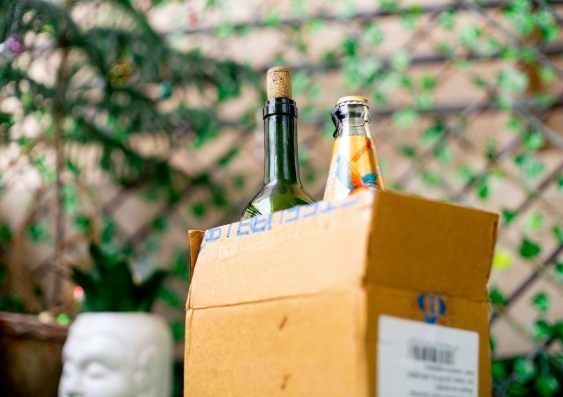Poor protections make buying alcohol online easy for minors
The regulation of online alcohol sales worldwide does not meet the same standard as walk-in bottle shops.
The regulation of online alcohol sales worldwide does not meet the same standard as walk-in bottle shops.

Buying alcohol online does not meet the same protection standards as other modes of alcohol supply, making it easy for minors to access at the touch of a button, UNSW research shows.
The research, published recently in Health Policy, compared the different legislative responses to online alcohol sales and home delivery of alcohol retailers worldwide and their effectiveness in the first international review of its kind. The researchers found that regulations often do not meet the same standard as walk-in bottle shops and could be insufficient to prevent underage access.
Lead author Stephanie Colbert, a PhD researcher at UNSW Medicine & Health, says regulation of online alcohol sales has fallen behind the rapid growth in sales.
“The alcohol home delivery sector is a growing market, with online alcohol sales increasing in Australia and overseas, particularly during the pandemic,” Ms Colbert says. “However, the regulation of online alcohol retailers is light and doesn’t meet the same standards we have for bricks and mortar shops.”
The researchers compared the policies governing online alcohol sales and home delivery in 77 jurisdictions across six countries. They also conducted a literature review of studies evaluating whether online alcohol retailers comply with age verification requirements.
They found that most jurisdictions permit the online sale and delivery of alcohol, but only seven jurisdictions (none in Australia) needed age to be verified online at the time of purchase. Without age checks online, the only barrier to a minor purchasing alcohol is access to a debit or credit card or PayPal account.
“This is insufficient given that children can open debit card accounts in most countries. Children in Australia can do so from age nine and without parental involvement from age 14, far below the minimum alcohol purchase age,” Ms Colbert says.
The research found that most jurisdictions rely on age verification occurring at delivery.
“Few jurisdictions require training for delivery drivers, while jurisdictions make explicit allowances for alcohol to be left unattended at the door at the buyer’s request.”
“This is flawed as it relies on a person over the legal purchase age being home to collect the delivery and a delivery person being trained and motivated to correctly verify age,” Ms Colbert says.
In Australia, age verification is implied but is not explicit in some states and territories. Furthermore, New South Wales, South Australia and Tasmania make explicit allowances for delivered alcohol to be left unattended. Except for the Northern Territory, no jurisdictions require delivery drivers to complete training in the responsible service of alcohol, despite this being a requirement for all bottle shop employees.
“Few jurisdictions require training for delivery drivers, while jurisdictions make explicit allowances for alcohol to be left unattended at the door at the buyer’s request,” Ms Colbert says.
The researchers say light regulation of alcohol home delivery services puts the community, particularly young people, at greater risk of alcohol harm than necessary.
Liquor authorities both overseas and in Australia have investigated alcohol home delivery services with alarming results. An investigation by the Californian Department of Alcoholic Beverage Control found that delivery services routinely deliver alcoholic beverages to minors. In Australia, a New South Wales Liquor & Gaming investigation found retailers delivering to playgrounds and schools without question.
“This is concerning given the well-established harms associated with alcohol consumption by underage youth, including an increased risk of damage to the developing brain and developing an alcohol use disorder in adulthood,” says co-author Dr Claire Wilkinson, Senior Research Fellow in the Drug Policy Modelling Program, Social Policy Research Centre.
“The same standards should apply to all forms of alcohol purchasing, whether from a bottle shop or online.”
With alcohol already involved in around 6000 deaths and 5000 hospitalisations every year in Australia, the researchers say all forms of alcohol sales should be held to the same standards.
“It doesn’t make sense to have a two-tiered regulatory system operating, where some alcohol sales are lightly regulated and others heavily,” Ms Colbert says.
“To minimise alcohol harm, Australia chooses to regulate the sale of alcohol in a certain way – bottle shop staff must have training in the responsible service of alcohol, no sales to intoxicated people, strict on age verification, no late-night takeaway alcohol.
“The same standards should apply to all forms of alcohol purchasing, whether from a bottle shop or online.”
The researchers say more research is needed to understand which policy, or combination of policies, are most effective for regulating online alcohol sales to minimise alcohol harm in the community.
“But in the meantime, our study can provide options for regulators seeking to make improvements in this area,” Ms Colbert says.
However, they say allowing the alcohol industry to self-regulate isn’t the way forward. Rather, the time is now for governments to review and reform the laws governing online alcohol sales.
“There is a clear conflict of interest when it comes to self-regulation, and it delays or prevents meaningful improvements and compliance – for example, Australia’s voluntary alcohol warning labels,” Ms Colbert says.
“Instead, governments should step in to prioritise improved regulation in this area with stricter standards and compliance to protect vulnerable people.”
In their next study, the researchers will investigate how online alcohol retailers utilise emails and text messaging marketing to directly promote their products.
“Information on the quantity and content of email and text messaging marketing could help us understand the impact of this promotional activity and inform stronger regulation of online alcohol sales more broadly,” Ms Colbert says.